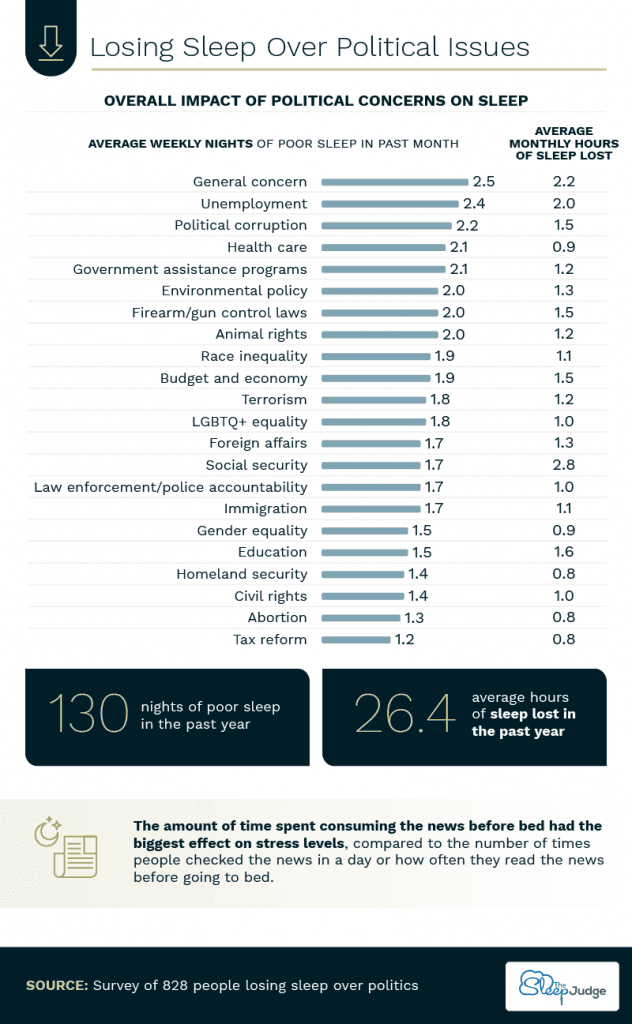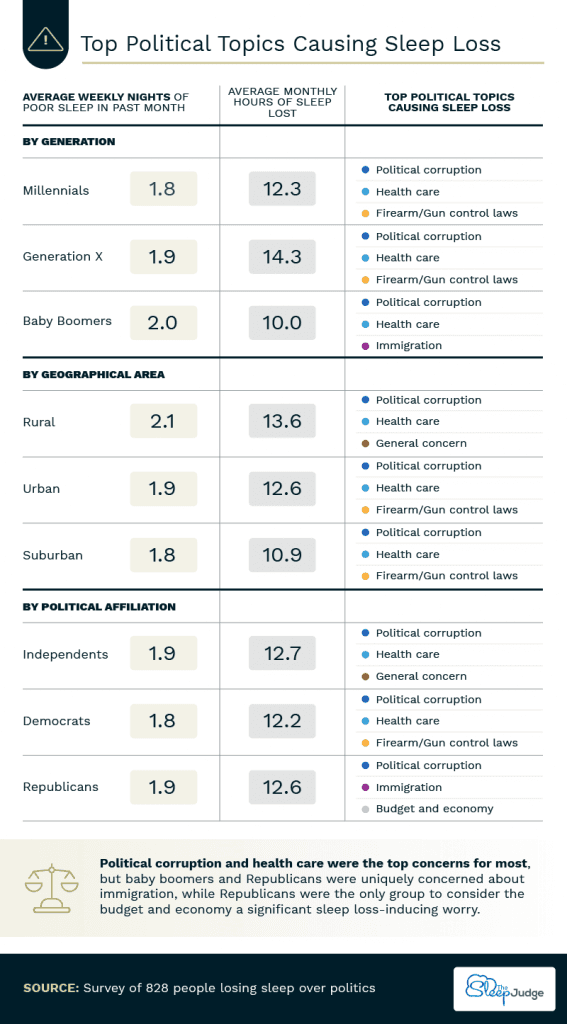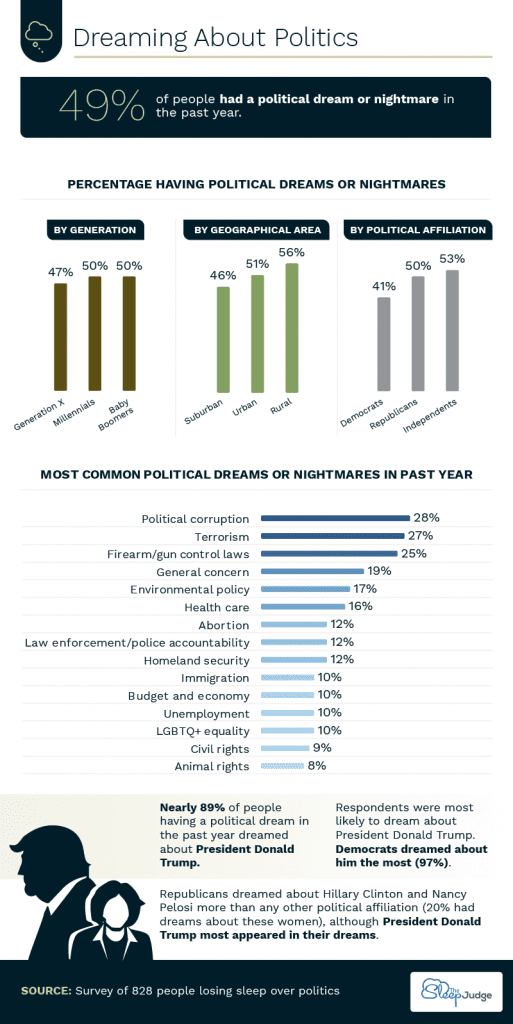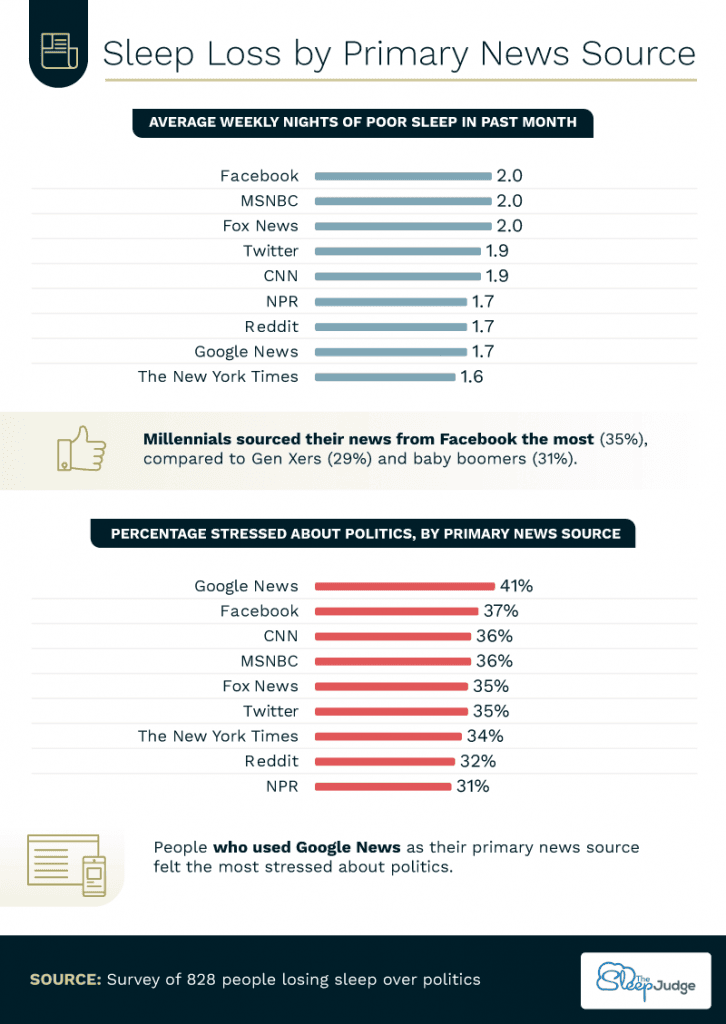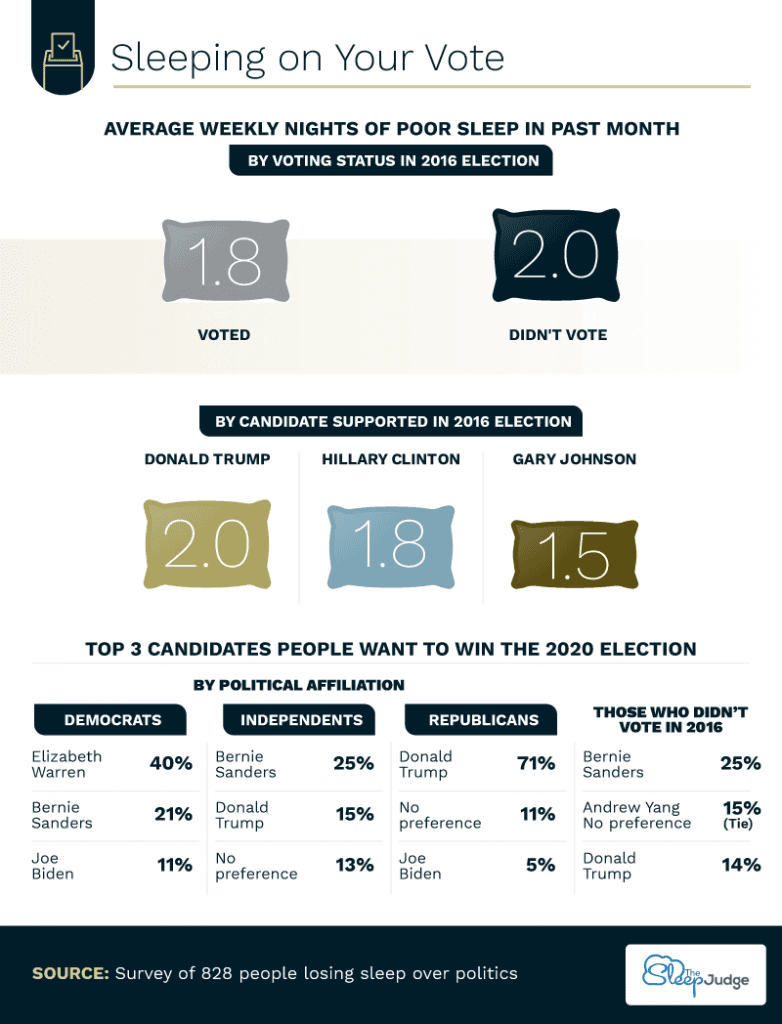The calendars haven’t rolled over yet, but political campaigns are expected to set yet another record high for advertisement spending in 2020. Americans are already managing the physical, mental, and emotional burdens of a particularly intense time in the political landscape (no matter which side of the aisle you happen to sit on), and it’s possible things may only get more extreme before they get better.
Not only does political talk affect the tension around a dinner table, but according to our study, thinking about political issues led to poor sleep, potentially up to two or more hours of sleep loss per month. More than making things tense around the dinner table this holiday season, there’s even more to worry about than who sits in the Oval Office. For a closer look at how many Americans are losing sleep over politics in 2019, we surveyed over 800 people about the news they consume and what keeps them up at night. Read on as we investigate which political issues were voted as the most concerning, how many people are dreaming about political scenarios, and which news sources (including Facebook and Fox News) are the most likely to keep you tossing and turning.
Tossing and Turning
In years past, it was considered taboo to bring up politics in polite conversation. Particularly in a professional environment, politics were deemed a touchy and personal discussion topic that could create animosity between co-workers or bosses. Today, political discourse is virtually unavoidable. From demands for impeachment to conversations on health care and the economy, some headlines (or tweets) are impossible to ignore.
When asked which political issues kept them up at night, general concerns were listed as the most common point of worry, causing people to lose sleep 2.5 times a week, for a total of 2.2 hours each month. In fact, general concern over the political climate in America disrupted sleep an average of 130 nights over the past year, accounting for more than 26 lost hours of sleep.
Following general concern, we found unemployment (2.4 nights of poor sleep each week), corruption in politics (2.2 nights), health care (2.1 nights), and government assistance programs (2.1 nights) as contributing to the biggest weekly drains on rest. While still concerning for some, tax reform (1.2 nights) and abortion (1.3 nights) were the least-concerning topics contributing to a loss of sleep.
Woke All Night
Republicans, Independents, and Democrats polled by this survey reported losing almost the exact same amount of sleep every month, regardless of their political ideologies. Republicans and Independents each had 1.9 nights a week with sleep loss due to politics, while Democrats had 1.8 nights.
In contrast, we found people living in rural areas were typically more likely (2.1 nights) to lose sleep over political stress compared to people living in urban (1.9 nights) or suburban (1.8 nights) environments. Political analysts continue to point at a growing divide between voters living in rural parts of the U.S. compared to those living in urban or suburban areas, a trend repeating itself all over the world.
Across the more than 800 Americans polled, we found the biggest topic weighing on people’s minds was corruption in politics. No matter how old they were, whether they identified as Republican or Democrat, or even where they lived, distrust of the political process runs rampant. As one analyst points out, Americans are so convinced that corruption is everywhere in their political process, it may be the one sentiment people on both sides of the aisle can actually agree on. Health care was another seemingly universal concern causing people to lose sleep at night (except among Republicans), followed by gun control laws for roughly half the people surveyed.
Vivid Imaginations
Nearly half (49%) of everyone surveyed who admitted to worrying about politics in the U.S. acknowledged having a dream or nightmare about at least one political topic in the last year.
While just 47% of Gen Xers had political concerns permeate their subconscious, half of millennials and baby boomers had at least one politically motivated dream or nightmare in the last year. Less common among Republicans (41%) compared to Democrats (50%), we found the topics most often causing these nighttime visions were corruption in politics (28%) and terrorism (27%). Americans we polled said Donald Trump was the most dreamed about figure in politics.
The Source of the Issue
It’s hard to be objective about the resource you turn to to keep you informed and updated with what’s happening around the world. Even if those sources are categorically defined as biased, you’re less likely to consider the evidence against them or agree with a critical interpretation. Like it or not, your news source could also be playing a role in how likely you are to be plagued by political concerns when you’re trying to fall asleep.
Tied for leading to the most nights of sleep impacted per week due to politics, people sourcing their news from Facebook, MSNBC, and Fox News all lose sleep roughly twice a week to their political concerns. Google News (41%), Facebook (37%), and CNN and MSNBC (36% each) were also the most likely to leave their readers or viewers stressed out about the current political climate. More Americans are getting their news from social media (including Facebook and Twitter) in 2019 than ever before, despite concerns that Facebook struggles to police the authenticity of paid ads on its platform.
People who said they get their news from The New York Times, Reddit, or NPR were some of the least likely to either feel stressed out about politics or stay up at night thinking about political concerns.
Instant Regret
People who refrained from voting in the 2016 presidential election admitted to having more nights of poor sleep (2) every week in the past month due to political concerns than those who exercised this particular constitutional right (1.8 nights). Among those who did vote, we found people who voted for Donald Trump lost more sleep over politics than those who voted for Hillary Clinton.
And what about the future? While 71% of Republicans wanted Donald Trump to win the 2020 presidential election, 40% of Democrats hoped for Elizabeth Warren to take up residence at the White House, followed by Bernie Sanders (21%) and Joe Biden (11%). In fact, 5% of the self-identified Republicans we polled also said they would like to see Joe Biden win the 2020 election.
Finding Sleep During Uneasy Times
Our concerns over the current political climate are impacting our ability to get a good night’s sleep an average of 130 nights a year, and that is no small problem. As our study shows, the things Americans are thinking about at night extend beyond general concerns over Washington; we’re also spending our nights thinking about issues like health care, gun control, and Social Security. And though we can’t promise the drama in Washington will subside anytime soon, we can help you find a way to better sleep. Visit The Sleep Judge and learn about the top products designed to help you achieve a quality night’s rest. From anti-snoring devices to mattress toppers, you’ll find everything you need to secure a better night’s rest.
Methodology and Limitations
We surveyed 828 Americans who lost sleep thinking about politics in the past year. Around 58% of our respondents were women, 41% were men, and 1% were nonbinary. Millennials comprised 52% of our survey respondents, 31% were from Generation X, and 17% were baby boomers. In terms of community type, we had 17% of our survey respondents report living in rural areas, 54% in suburban areas, and 29% in urban areas.
Respondents were asked to choose from a list of political topics to indicate which issues they thought about when they should have been sleeping. Then, we asked them to indicate how many minutes per month they felt were lost to thinking about each topic during their bedtime, as well as how many nights a week they felt they lost sleep due to thinking about politics. We removed any topic that did not have at least 100 responses to create averages that were most accurate. We also removed extreme outliers from the entries regarding how many minutes were lost to each political issue per month. We weighted our data by generation and political affiliation to more accurately reflect the American population in our explorations.
No hypotheses were statistically tested, and survey data may be limited by issues such as telescoping, exaggeration, and selective memory.
Fair Use Statement
Feel like voting for more people to see the results of this survey? Don’t lose sleep over it. Just include a link back to this page in any story written for noncommercial use as credit to our contributors for their work.

